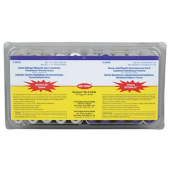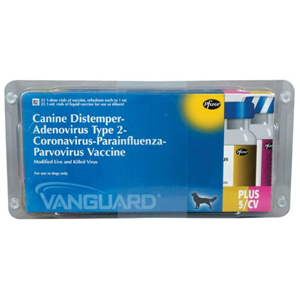Vaccines prevent certain illnesses in dogs that stem from viral or bacterial infections. They introduce a dog's immune system to a modified version of the threat so it can efficiently recognize and neutralize it upon subsequent exposures. In this way, the dog becomes immune to the virus or bacteria.
Recommendations for what vaccinations a dog should get and when she should get them vary depending on a variety of individual factors. A dog's breed, age, risk factors of exposure, and overall health are considered. However, there are four core vaccinations, as identified by the American Animal Hospital Association (AAHA), considered essential to all dogs: canine parvovirus, canine adenovirus, canine distemper, and rabies. Talk to your veterinarian about an appropriate vaccination schedule for your dog.

Canine Parvovirus Vaccination
Canine parvo is a potentially fatal condition caused by the parvovirus. Infection usually comes from exposure to contaminated fecal matter. This illness, which affects the gastrointestinal tract, is difficult to treat and highly contagious. Common symptoms include bloody diarrhea, vomiting, fever, quick dehydration, and lethargy. Today's parvovirus vaccines effectively protect against all current strains of the virus. Typical initial administration is in puppies between 6 and 8 weeks of age, with subsequent doses given every three to four weeks until the puppy is 12 to 14 weeks old. A booster is often given in one year, and then once every one to three years.
"Recommendations for what vaccinations a dog should get and when she should get them vary depending on a variety of individual factors."
Canine Adenovirus Vaccination
Canine adenovirus type 1 (CAV-1) causes infectious hepatitis. This viral infection is primarily transmitted via contaminated urine, feces, or saliva. Common symptoms of canine hepatitis include fever, tissue swelling, and abnormal bleeding. The disease attacks the kidneys, liver, and blood vessels. Most contemporary vaccines provide inoculation against CAV-1 as well as canine adenovirus type 2 (CAV-2), one of several causes of kennel cough, or canine infectious tracheobronchitis. Initial adenovirus vaccinations are generally given to puppies at 8 to 12 weeks of age, with a second dose given at 16 weeks and a third dose one year later. Boosters are often given once every one to three years.

Canine Distemper Vaccination
Canine distemper is a fatal viral infection that cannot be cured. Because the virus is airborne, it is highly contagious. It attacks a dog's gastrointestinal and respiratory tracts and the nervous system. At the onset, a dog appears to have a cold, with symptoms such as a runny nose, watery eyes, cough, fever, and diarrhea. Symptoms become more serious, and often include twitching, seizures, and paralysis. Puppies are commonly given an initial distemper vaccination between 6 and 8 weeks of age, with subsequent doses administered every four weeks until 16 weeks of age. A booster is usually given one year later and then every one to three years thereafter.
Rabies
Rabies is a viral infection that can affect any mammal. It is transmitted via the bite of an infected animal. Rabies affects the central nervous system, causing a fatal brain infection. The condition has no cure, but it can be prevented with administration of a vaccine soon after exposure. Immunity can be also be preemptively established with the rabies vaccine, generally first given to puppies between 3 and 6 months of age. A booster is recommended one year later, and then once every one to three years.
Guidelines for Canine Core Vaccines
| Vaccine |
Vaccination Guidelines
(under 16 weeks old) |
Vaccination Guidelines
(over 16 weeks old) |
| Parvovirus (CPV)* |
1 dose of vaccine with modified live virus (MLV) every 3-4 weeks from 6-8 weeks until 16 weeks of age |
2 doses of vaccine with MLV given 3-4 weeks apart. A booster at 1 year and then revaccination recommended every 3 years |
| Distemper (CDV)* |
1 dose of vaccine with modified live virus (MLV) every 3-4 weeks from 6-8 weeks until 16 weeks of age |
A booster at 1 year and then revaccination recommended every 3 years |
| Advenovirus (CAV-2)** |
1 dose of vaccine with modified live virus (MLV) every 3-4 weeks from 6-8 weeks until 16 weeks of age |
A booster at 1 year and then revaccination recommended every 3 years |
| Rabies |
1 dose of killed rabies vaccine at 16 weeks or 4 months of age |
1 dose of killed rabies vaccine for adult dogs with unknown vaccination histories and then revaccination recommended every 3 years |
*Guidelines for killed parvovirus vaccines and recombinant distemper vaccines are different than those listed above.
**Some veterinarians do not recommend vaccination with CAV-1 vaccines, because using a CAV-2 vaccine results in immunity to adenovirus type 1 and CAV-2 vaccines usually have less frequent adverse effects.
These are only guidelines for canine core vaccinations and should not be used without consulting your veterinarian first. Your veterinarian will be able to give more specific recommendations based on your pet's individual needs. Some pets may need additional non-core vaccines like Bordatella or Lyme Disease vaccines. Be sure to follow your veterinarian's specific instructions regarding your pet's vaccinations.
Sources
http://pets.webmd.com/dogs/guide/routine-vaccinations-puppies-dogs
http://pets.webmd.com/dogs/guide/core-dog-vaccinations
http://www.extension.purdue.edu/extmedia/4H/4-H-852-W.pdf
http://www.vetmed.ucdavis.edu/vmth/small_animal/internal_medicine/newsletters/vaccination_protocols.cfm
The above is provided for information purposes only and should not be used for the diagnosis or treatment of any condition.
This information does not cover all possible variables, conditions, reactions, or risks relating to any topic, medication, or product and should not
be considered complete. Certain products or medications may have risks and you should always consult your local veterinarian concerning the treatment of
your pet. Any trademarks are the property of their respective owners.